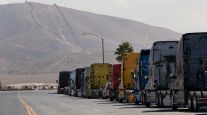MassLive.com
Northeast States Weigh Transportation and Climate Initiative

[Stay on top of transportation news: Get TTNews in your inbox.]
Massachusetts Gov. Charlie Baker is one of the leaders pushing for a regional program that would raise the price of gas while curbing greenhouse gas emissions from transportation.
The Transportation and Climate Initiative, or TCI, is expected to become a major focus of state government, environmentalists and businesses across the Northeast over the coming months and years as TCI takes shape and states consider whether to commit to the program.
More details about what TCI might look like will become available Dec. 17, when a draft memorandum of understanding is released.
What is TCI?
TCI is a “cap-and-trade” system.
A cap is set on the total amount of carbon dioxide that can be released from vehicles using transportation fuels. This cap would be lowered as time goes on.

Transportation fuel suppliers — the wholesalers that bring fuel into Massachusetts — must then buy allowances for every ton of carbon dioxide their fuel will produce. The total number of allowances is limited, based on the cap.
An auction is held in which fuel suppliers can bid to buy allowances. The price of those allowances depends on the market. Allowances can be traded.
States get money from the sale of the allowances. The states would be required to invest that money into projects that reduce carbon emissions from transportation.
What does this accomplish?
By putting a price on carbon and limiting the total amount emitted, the program is expected to incentivize development of fuel-efficient technologies and incentivize people to use less fuel. It will also raise money to spur state investments in new technologies, such as electric buses.
Ultimately, this will reduce greenhouse gas emissions — something Massachusetts is required to do under the state’s Global Warming Solutions Act — and help address climate change.
Has anything like this been done before?
This is the first attempt to apply a regional cap-and-trade system to transportation, although a similar program is in place in California. But many of the same states are involved in the Regional Greenhouse Gas Initiative, which applies a very similar cap-and-trade system to emissions from power plants.
Who is involved?
Twelve northeast and mid-Atlantic states plus Washington, D.C., are involved in the discussions: Connecticut, Delaware, Maine, Maryland, Massachusetts, New Hampshire, New Jersey, New York, Pennsylvania, Rhode Island, Vermont and Virginia.
Each state will have to sign onto the program individually, so it is not yet known which states ultimately will join.
Overall, these states have 72 million people and 52 million registered vehicles.
Does it matter if all 12 states join?
Part of the appeal of a regional system is that, if the same price applies across the region, no one state will be put at a competitive disadvantage.
Chris Carlozzi, Massachusetts state director of the National Federation of Independent Business, worried that businesses along Massachusetts’ borders will be hurt if New Hampshire and Vermont do not sign on.
“Massachusetts customers may cross the border to other states to make fuel purchases and other purchases,” Carlozzi said.
Baker said he would like to see as many states as possible join. “I think the key here is you want enough of a universe that you believe it will be meaningful and significant to the markets in which it operates,” Baker said.
How much will TCI raise gas prices?
That remains to be seen, depending on how the program is structured. Price estimates are expected to be included in the memorandum of understanding released Dec. 17.
According to the National Federation of Independent Business, a similar program in California raised the price of gas by 12 to 14 cents a gallon.
Want more news? Listen to today's daily briefing:
Distributed by Tribune Content Agency, LLC



